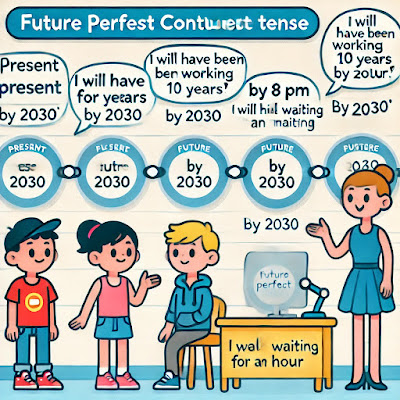Start with an Opening Question
When starting a conversation about the future, begin with an open-ended question to invite the other person to share their thoughts.
Examples:
What do you think your life will be like in 40 or 50 years?
Have you ever thought about how life will change in the future?
Where do you see yourself living in 2060?
Use future tenses
To talk about life in the distant future, you’ll need to use different future tenses. Here’s a quick guide:
Simple future (will)
Use this tense to make predictions or express intentions.
Examples:
I will live in a big city.
People will use flying cars in the future.
Future continuous (will be + verb-ing)
Use this tense to talk about actions that will be happening at a specific time in the future.
Examples:
In 30 years, I will be working as a scientist.
We will be exploring space by 2050.
Future perfect (will have + past participle)
Use this tense to describe actions that will be completed by a certain time in the future.
Examples:
By 2040, I will have started my own business.
By 2050, people will have developed advanced robots.
Future perfect continuous (will have been + verb-ing)
Use this tense to describe actions that will continue for a certain period of time before a specific point in the future.
Examples:
By 2035, I will have been teaching English for 15 years.
By 2040, they will have been living in that city for 20 years.
Key vocabulary for future conversations
Here are some helpful words and phrases:
Dream: a goal or ambition.
Example: My dream is to become a doctor.
Plan: something you decide to do.
Example: I plan to travel the world.
Technology: tools or machines made to solve problems.
Example: In the future, technology will make life easier.
Achievement: something you succeed in doing.
Example: My biggest achievement will be writing a book.
Travel: to go to different places.
Example: I will travel to Europe one day.
Practice questions and responses
When discussing life in the future, use these examples to guide the conversation:
Question: What will you be doing in 20 years?
Response: In 20 years, I will be managing my own company.
Question: Where do you think you will live?
Response: I think I will live in a house near the ocean.
Question: What will you have achieved by 2050?
Response: By 2050, I will have finished building my dream home.
Question: How do you think technology will change our lives?
Response: I believe people will have personal robots to help with daily tasks.
Conversation example
Situation: Two friends talking about their future
Tom: Hey, Sarah! Have you ever thought about what your life will be like in 30 years?
Sarah: Oh, yes! By 2050, I think I will have been working as a doctor for 20 years. What about you?
Tom: I hope I will be traveling the world. Maybe I will live in different countries every year!
Sarah: That sounds amazing. What will you be doing for work?
Tom: I’ll probably be a freelance photographer. By 2050, I will have taken photos of every continent!
Sarah: Wow, that’s a great dream. I hope you achieve it!
Tips for better conversations
Be curious: Ask follow-up questions to keep the conversation flowing.
Example: "Why do you want to live in another country?"
Use your imagination: Talking about the future allows you to dream big, so be creative.
Practice listening: Respond to what the other person says to show interest.
Practice activity
Try having a conversation with a partner using these steps:
- Start with a question: "What do you think your life will be like in 20 years?"
- Take turns sharing your thoughts about your career, family, and dreams.
- Use at least one sentence with the future perfect tense.
Grammar
Future Perfect Continuous
What is the Future Perfect Continuous?
The Future Perfect Continuous is used to describe an action that will continue for a period of time and will be completed at or before a specific point in the future.
Forming the Future Perfect Continuous
Structure:
Subject + will + have + been + verb-ing
Examples:
By 2030, I will have been living in this city for 10 years.
She will have been studying English for 5 years by next month.
When to use it
To show the duration of an action up to a point in the future:
By 8 PM, they will have been working for 10 hours.
To talk about an action that continues and overlaps with a future event:
When you arrive, I will have been waiting for an hour.
Common time expressions
The Future Perfect Continuous is often used with time expressions like:
By (a certain time): By 2025, by next month, by next year.
For (a duration): for 5 years, for 3 months, for 2 hours.
Examples in context
By 2040, scientists will have been developing AI technology for decades.
He will have been playing soccer for 20 years by the time he retires.
Quick Tips
Use the tense to emphasize how long an action has been happening in the future.
Combine "by" + time and "for" + duration for clarity.


Comments
Post a Comment